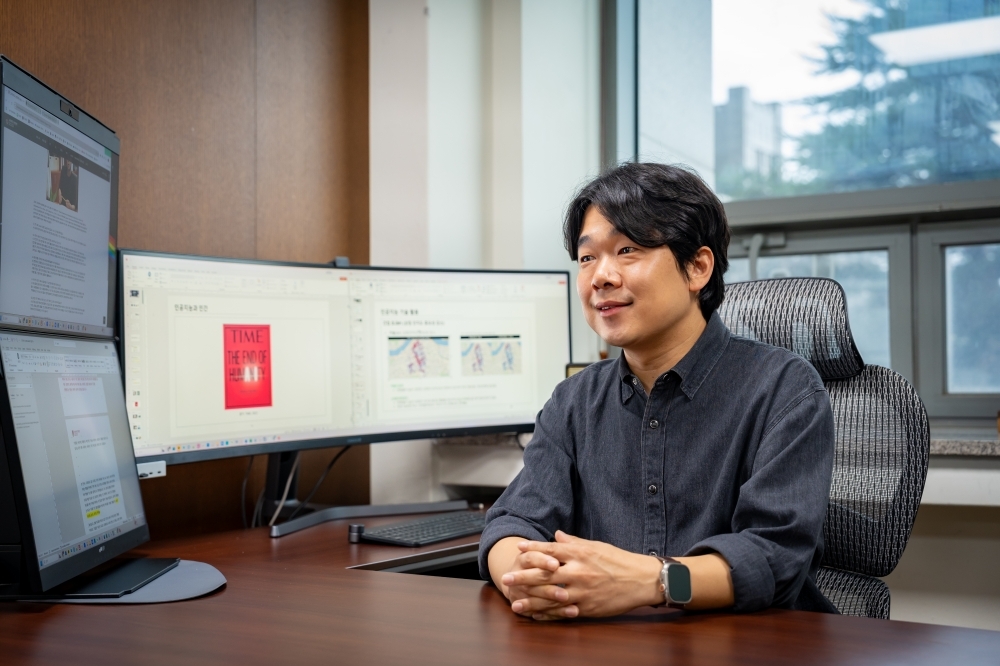News
KUBS News
Interview with Professor Gunwoong Lee – Recipient of the SK Paper Award

In 2025, Professor Gunwoong Lee of Korea University Business School was co-authored a paper titled "Consumer Evaluation of Digital Product Innovations: Disentangling Effects of Novelty, Familiarity, Complementarity" (with Nilla Zhang and Wai Fong Boh), which was accepted for publication in MIS Quarterly. The paper was also honored with the SK Paper Award. This study empirically analyzes how consumers respond to hardware innovations in digital products, focusing on the balance between novelty and familiarity, as well as complementarity with software. It provides strategic insights into the timing and approach of innovation introduction. The paper has been recognized for its contribution to the field of Information Systems, particularly in extending the practical design implications of technological innovation and highlighting its potential societal impact.
Q1. First of all, congratulations on receiving the SK Award. Could you share your thoughts on this honor?
A1. I’m truly honored to receive such a meaningful award. This research is based on a topic I first envisioned nearly ten years ago when I began my academic career, so it is deeply rewarding to see it come to fruition after such a long journey. Above all, I believe this achievement was made possible thanks to the outstanding research environment and support provided by Korea University Business School.
Q2. Could you briefly introduce the research for which you received the award?
A2. This study explores how consumers evaluate innovations in digital products. When a new electronic device is released, people often respond with a mix of anticipation and skepticism. We explored how companies can present their innovations in ways that are more likely to be positively received by consumers. More specifically, the research analyzes how hardware innovations are perceived by consumers in the context of digital products.
Q3. What motivated you to start this research?
A3. I believe that academic research should reflect changes in real life. I’ve always been curious about questions like, “Why are people surprised by new technologies?” and “What kind of expectations do Apple’s annual product launches create?” These interests led me to analyze product innovations and consumer responses across 62 smartphone models produced by 10 major global manufacturers. Based on this dataset, I explored how companies can introduce innovations in ways that better align with consumer perceptions and preferences.
Q4. What kind of impact do you think your research might have on society or industry?
A4. I believe this research offers practical strategic insights, particularly for the IT industry — notably smartphone and digital device manufacturers. When innovations are not well-received in the market, the consequences can be significant not only for individual firms but also for the broader industry. This study provides concrete guidance on when, how, and with what combinations of features and software innovations should be introduced in order to receive positive consumer evaluations, making it practically meaningful for business decision-makers.
Q5. Could you share your future research plans or any specific topics you're particularly interested in?
A5. Recently, I’ve become increasingly interested in how information technology affects local communities and digitally marginalized groups. For example, technologies such as virtual queuing systems are becoming more common in easing daily inconveniences. I hope to examine how such technologies can go beyond providing simple convenience to play a role in revitalizing local economies, bridging the digital divide, and enhancing accessibility for socially underrepresented groups. Ultimately, I aim to explore how technological advancement can be designed and implemented in ways that extend their benefits to society at large—not just to a privileged few.
Q6. Do you have any messages you’d like to share with students?
A6. The world we live in is changing rapidly, especially with the pace of advancement in artificial intelligence (AI), which is unlike anything we’ve seen in the past few decades. That’s why understanding AI — what I call AI literacy — is incredibly important. It’s not just about following the technology, but about understanding how it works, what benefits it can bring, and how it can be purposefully applied. I encourage students not to fear change but to stay curious and take initiative in learning.
Summary of Professor Gunwoong Lee’s Paper
"Consumer Evaluation of Digital Product Innovations: Disentangling Effects of Novelty, Familiarity, Complementarity"
This study analyzes how digital product manufacturers can strategically manage the balance between familiarity and novelty when introducing hardware innovations. Focusing on devices such as smartphones, the paper empirically examines the impact of hardware component innovations on consumer evaluation. In particular, it investigates how the timing of innovation and the presence of complementary software support.
Key findings suggest that hardware features familiar to consumers are more positively received when introduced early in the product lifecycle and accompanied by intuitive software interfaces. In contrast, introducing unfamiliar and novel features too early can be counterproductive; in such cases, the presence of supporting software may actually reinforce negative consumer perceptions. Based on these differences, firms need to carefully design the timing and software integration strategy for hardware innovations, taking into account consumer receptivity.


